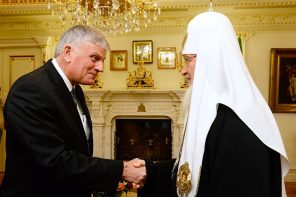If you were raised in American evangelicalism during the past thirty years, you’ve probably come to associate Jesus with certain character traits. If you’ve had access to a television over this same span, you’ve probably come to associate Donald Trump with certain others. In most cases, these are diametrically opposed. Where Jesus is humble, Trump is prideful; where Jesus is pure, Trump is lustful; where Jesus is selfless, Trump is the paragon of worldly corruption and greed. On these points and many others, Jesus emerges as the perfect foil for Trump, the contrast always appallingly sharp. If Jesus is the Christ, you might say, Trump is the anti-Christ.

Believe Me: The Evangelical Road to Donald Trump
John Fea
Eerdmans
June 30, 2018
Historian John Fea is an evangelical, but not a fan of Donald Trump. When he received the 2016 election results, he reported feeling “shocked,” “saddened,” and “angry,” less about Trump himself than about the evangelicals who had carried him. In his new book, Believe Me: The Evangelical Road to Donald Trump, Fea crafts a historical narrative to explain—and often to critique—the decision-making process of the infamous 81 percent. [For more, read Greg Carey’s critique of Believe Me here. — eds]
Why do evangelicals believe Donald Trump?
Donald Trump drew upon a political playbook that conservative evangelicals have been employing since the 1970s. Jerry Falwell Sr. drafted it when he founded the Moral Majority in 1979, and it responds to a variety of familiar social and cultural issues—the “wall of separation” between church and state, the removal of prayer and Bible reading from public schools, the desegregation of evangelical academies in the south, Roe v. Wade, gay marriage, new immigration patterns, and a host of others.
Trump has learned to speak this political language with fluency, and so was able to convince a strong majority of white evangelicals that he would deliver on these issues. He’s a unique character, certainly, but he positioned himself as the rightful heir of this historical legacy. So as surprising as his victory was, we shouldn’t be too surprised that he rallied evangelicals to achieve it.
If evangelicalism is supposed to be rooted in faith, hope, and love, you note that it’s now primarily driven by fear, nostalgia, and a will to power. Has this always been true, or has the movement been corrupted?
American evangelicals have been fearful, nostalgic, and desirous of political power to varying degrees since the 17thcentury. In a chapter titled “A Short History of Evangelical Fear,” I try to show that fear of social, cultural, and demographic change has been present throughout the nation’s history and, whenever these changes have occurred, they’ve been followed by backlash in the form of nativism, racism, isolationism, etc. Historically, evangelicals have always been at the forefront—often leading that backlash. They have always been nostalgic for what they imagine to be better, holier times, relying on declension narratives to chart America’s fall from grace. And there have been various moments during which evangelicals have pursued political power rather than self-sacrificial love.
I do think that the 1970s and 80s (which were largely a response to the 1960s) represent an important moment. Prior to this, evangelicals felt much more comfortable in the culture. We can debate whether or not America is a “Christian nation” in a legal or Constitutional sense, but it has certainly been culturally Christian since the founding. Once these bedrock Christian social and cultural beliefs and practices—traditional marriage, prayer in schools, the celebration of Christmas as the only legitimate holiday in the month of December, to name a few—lose their privileged position, many evangelicals turn to politics to save them.
In Trump’s speech, these appeals often have racial dimensions. Why are white evangelicals comfortable with this?
I am hesitant to say that all evangelicals are comfortable with this, but many of them are.
One way to look at this is to observe that evangelicals have always prioritized certain social issues over others, and race has never been one of their priorities. Abortion, they would argue, transcends race. People of all races have abortions and “kill babies.” Traditional marriage, similarly, is an institution that transcends race. I think such a view goes back to one of the defining beliefs of American evangelicalism—that all humans, of all races and ethnicities, can be saved by the gospel. Abortion and marriage are universal, race is particular. This is how many evangelicals see it. Many of them may be uncomfortable with Trump’s racist remarks, but they are willing to look the other way because Trump has the right policies on the issues they deem to be more important.
But we also must remember that American evangelicalism has always been a very white version of Christianity. Evangelicals have always been fearful of African Americans and the threat they are perceived to pose to a white Christian America. For example, much of the Southern evangelical approach to reading the Bible was forged in the context of their defenses of slavery. So there is a long tradition of racism in white evangelicalism, just as there is a long tradition of racism among white Americans writ large. Yet evangelicals claim to follow the teachings of Jesus, a set of moral principles that should motivate them to fight racism.
You coin the term “court evangelicals” to refer to figures like Franklin Graham, Jerry Falwell Jr., Robert Jeffress, and others who routinely kiss Trump’s ring. What does courtliness entail?
When I think of courtliness, I think about the Medieval and Renaissance courts, where courtiers would attend the king, advise him, flatter him, and never contradict him. Often these were clerics and priests, and very often they were perfectly willing to silence their prophetic voice in order to gain the favor of the king. There is a long history of this kind of flattery in the Western tradition.
When I see people like Falwell, Graham, Jeffress, Ralph Reed, Paula White, and any of these others who go to the White House to flatter Trump and never offer a word of criticism—whether it be about Stormy Daniels or building a wall or anything else—I’m reminded that they have sacrificed their moral vision in order to get whatever they can from him.
That’s what I mean by court evangelical—a Christian leader who has sacrificed deeply held convictions on the alter of worldly power.
These people are famous moralists. Have they compromised their moral authority?
Absolutely. More than that—and I’ll speak here as an evangelical—they have sacrificed their Christian witness. These court evangelicals have not only built their careers around moral crusades and culture wars, but on the claim that the Christian gospel can transform human lives. As they would say, the gospel message can save you from hell. If you believe that—that the gospel has the power to save and transform lives—then your mission in life is to share that message with as many people as possible.
Falwell and Graham and Jeffress and others have built their careers around this idea. So when they associate with a man who is a serial adulterer, who disrespects women, who brags about grabbing women by their genitals, who wants to build a wall—and when they do so while publically refusing to condemn these shameful behaviors—they forfeit their credibility to share the gospel.
Are you concerned that the association between evangelicalism and Trumpism will drive people out of their churches?
I think it already has. When people see the way that evangelicals have bowed to power, have turned to a political strongman for support, who are willing to stand by and accept both the character flaws and the policies of this president—I think they are inclined to say that, if this is Christianity, it is a Christianity that I want nothing to do with.
I’m not a sociologist, so I can’t say for sure whether these people are leaving the church and becoming atheists or agnostics. But as I argued in a Washington Post piece last year, I think that Trump is going to prompt a realignment within American Protestantism—especially conservative Protestantism. When historians look back on this period, they are going to see, once again, that politics has shaped evangelicals, not the other way around.
You’ve dedicated this book to the 19 percent—the 19 percent of white evangelicals who refused to vote for Trump. What is your message to them?
Don’t let fear overcome hope. Don’t be seduced by power, but live as a witness for the Gospel in a humble, servant-minded way. Realize that nostalgia teaches us to think about the past in selfish ways—to imagine fondly a time when life was “great” for us without recognizing that for others the same era in history may have been a living hell.
Many of the 19 percent already get this. My message for them is to continue to live out an authentic Christianity and to maintain dialogue with the 81 percent. If we are to sway our fellow believers to a healthier view of Christian civic engagement, we need to be active in the churches. Rather than abandon evangelicalism, we should dig in and serve as missionaries within the fold, hoping to persuade our brothers and sisters to think more deeply and more seriously about the role of Christianity in public life.





